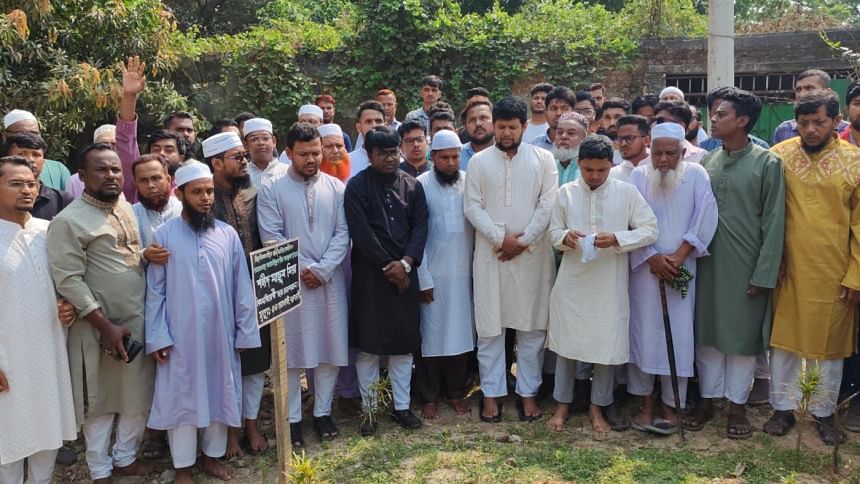No room for extremism

Government advisers have reiterated their commitment to combatting religious extremism and insisted that militancy is not on the rise.
Their remarks came in response to an article by The New York Times titled "As Bangladesh Reinvents Itself, Islamist Hard-Liners See an Opening".
The NYT article said Islamist extremism surged in Bangladesh following the fall of Sheikh Hasina's government, with fundamentalists imposing restrictions on women, persecuting minorities, and pushing for a more religiously conservative state.
The Times said that the interim government was reluctant to crack down on fundamentalist forces, allowing them to gain public space.
While talking to journalists after visiting the family and grave of a July martyr yesterday, Information and Broadcasting Adviser Mahfuj Alam said there would be no place for extremism on Bangladesh's soil.
"Our government maintains a strict stance on this issue and will continue to do so in the future. If discussions and warnings are not enough, tougher measures will be taken," he said.
He further said, "The efforts to establish Bangladesh as a democratic state under the leadership of Prof Muhammad Yunus will continue. No extremist group will be allowed to take advantage of the situation.
"We firmly declare that the government will play a strong role in safeguarding Bangladesh's democratic system. No extremist activities will be allowed to rise."
Home Adviser Md Jahangir Alam Chowdhury yesterday claimed that there was no rise in militancy across the country since the interim government took office. He was speaking to reporters after inspecting several police stations.
"Since we assumed responsibility, there has been no resurgence of militancy. We will work together with the people to resolve any issues that arise," the home adviser said.
The Chief Adviser's Press Wing lambasted the NYT article by calling it "oversimplified" and "misleading".
On its CA Press Wing Facts Facebook page, it said, "The New York Times article paints a troubling and one-sided view of Bangladesh, suggesting that the country is on the brink of being overtaken by religious extremism. This portrayal not only oversimplifies the political and social dynamics of the country but also risks unfairly smearing an entire nation of 180 million people."
"It is crucial to acknowledge the progress Bangladesh has made over the last year and the complexity of the situation, rather than relying on selective, incendiary examples that paint an inaccurate picture," it said.
The press wing said that it was "unconscionable to define the entire country by a few isolated events".
It maintained that many attacks on minority groups were politically driven, not religious violence.
"Many of the clashes between different groups in the wake of Hasina's ouster have been misrepresented as sectarian violence, when in reality, they were largely political in nature. Political factions often use religion to galvanise support, which complicates the issue and risks conflating political unrest with religious persecution. It is misleading to frame the entire situation as a sectarian conflict, as it ignores the true political and socio-economic factors at play," it said.
The press wing also said the government was committed to protecting all minority communities.
"The country's commitment to protecting its diverse population—whether Muslim, Hindu, Christian, or any other community—remains steadfast. While there will always be hardliners who spew hatred at rallies and on social media, it is our responsibility to deny them the oxygen their anger requires."
The NYT article said that the interim government struggled to contain these forces and that the Jamaat-e-Islami and local clerics were exploiting the political vacuum to advance religion-based politics.
The Jamaat aims to establish an Islamic welfare state modelled after Turkey, blending politics with religious principles, the article said.
It also mentioned the banned Islamist outfit Hizb ut-Tahrir's march for an Islamic caliphate and laws with the death penalty as punishment for blasphemy.
The article said future constitutional changes might remove secularism from the preamble, signalling a shift towards a more religiously defined state.

 For all latest news, follow The Daily Star's Google News channel.
For all latest news, follow The Daily Star's Google News channel. 



Comments